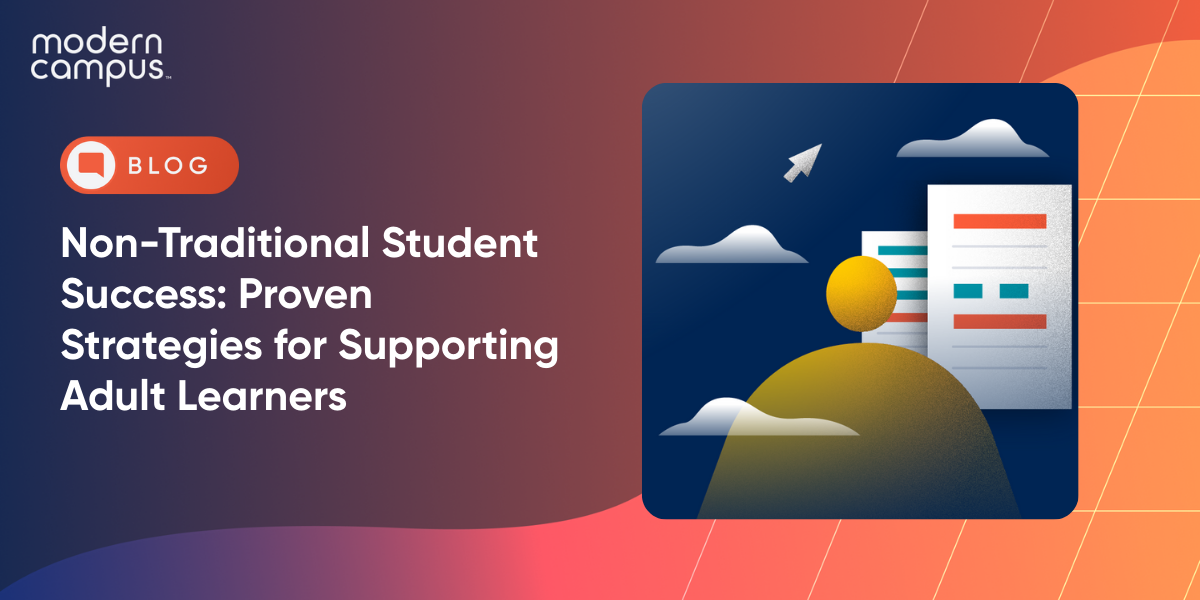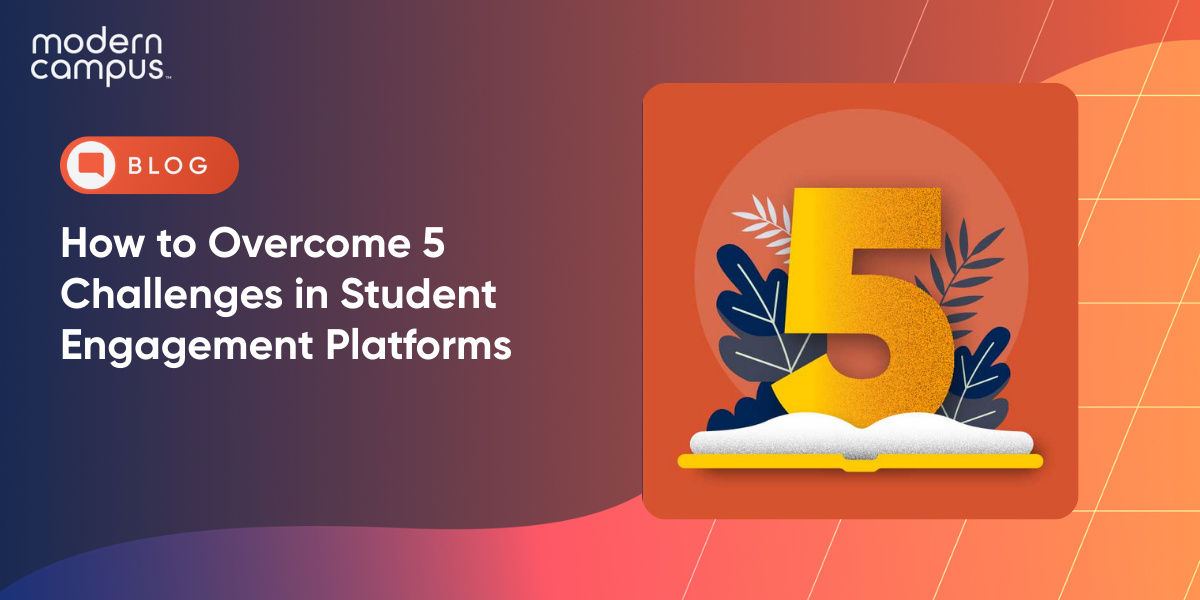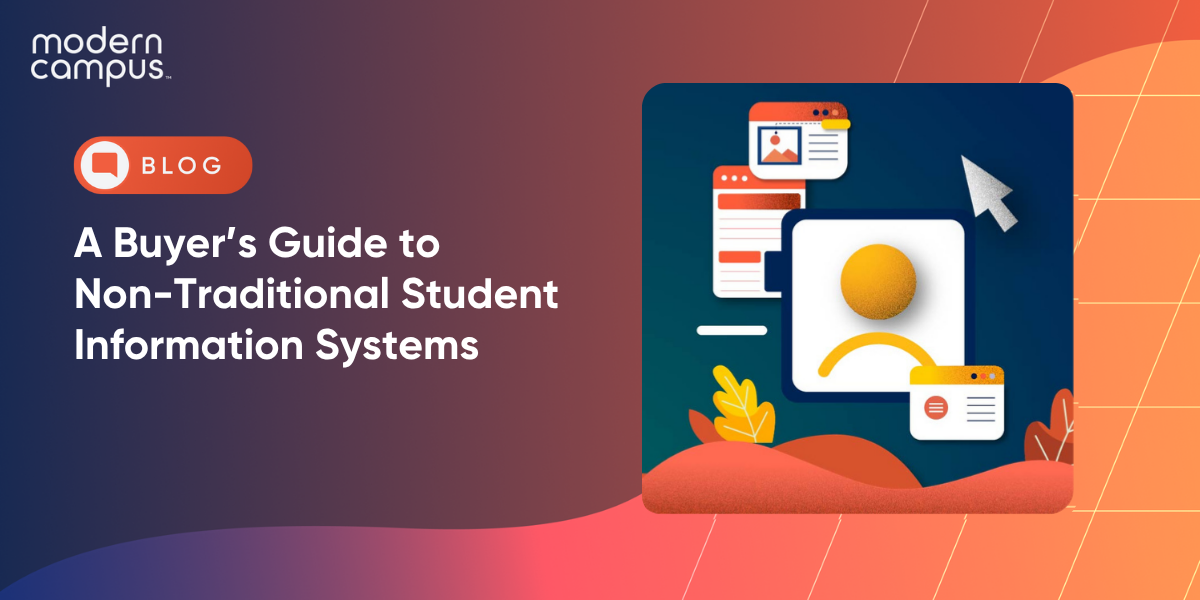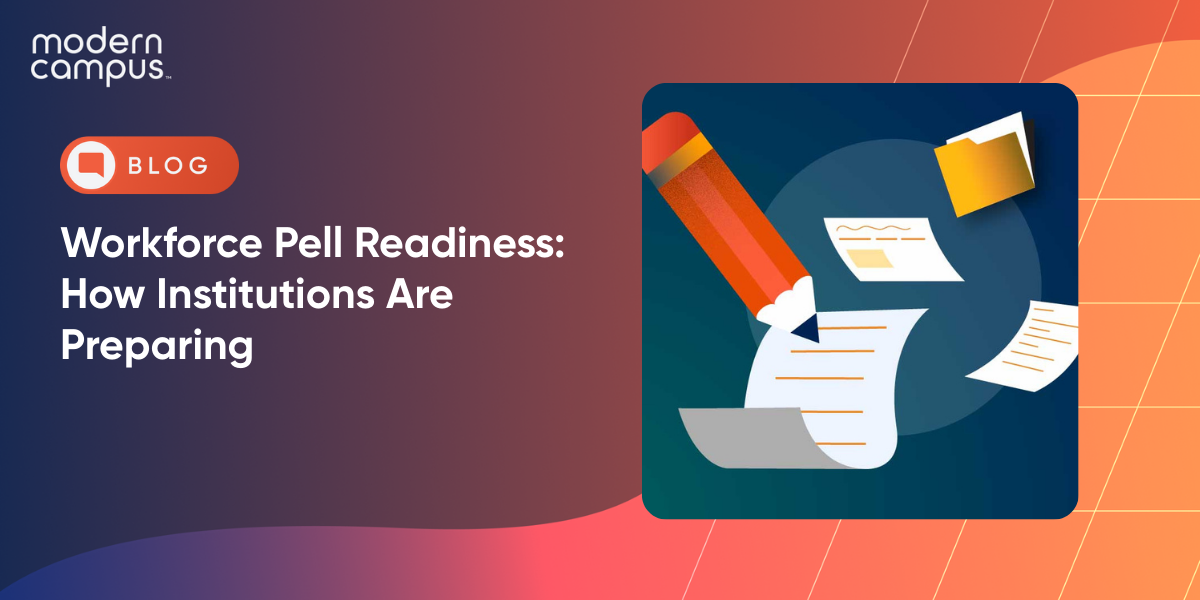Non-Traditional Student Success: Proven Strategies for Supporting Adult Learners
Non-traditional students are the fastest growing segment in higher education, with significant growth among learners aged 21+.
- Successful institutions are implementing flexible technology platforms, competency-based programs and comprehensive support systems.
- Key strategies include mobile-first learning experiences, automated enrollment processes and data-driven retention approaches.
The future belongs to institutions that can seamlessly integrate continuing education with workforce development needs.
Data for fall 2024 shows undergraduate enrollment increasing by 3%. All sectors are seeing growth in the number of undergraduates, but the most prominent changes are happening in the non-traditional student segment. Focusing on non-traditional student success has become essential for institutional survival.
Adult learners in higher education are reshaping every aspect of the experience, from course delivery to student services. These learners bring unique challenges and opportunities that require a different approach to education. With overall enrollments in online and PCE programs having declined, reaching one of the lowest levels since 2021-2022, institutions must refine their strategies to better serve adult learners who are actively seeking flexible, career-aligned educational opportunities.
Who Are Today's Non-Traditional Students?
The definition of non-traditional students continues to evolve, but the core characteristics remain consistent. These learners typically fall into several categories: working professionals seeking career advancement, parents balancing family responsibilities with education, military veterans transitioning to civilian careers, and individuals pursuing career changes later in life.
Modern non-traditional students expect educational experiences that mirror the efficiency and convenience they receive from other digital services. With 87% of households having smartphones, computers or tablets, mobile learning apps provide essential accessibility for learners who study during brief time windows. These students are looking for strategic investments in their future that meet real career goals.
What sets today's adult learners apart is their consumer mindset. They approach education as sophisticated buyers who evaluate programs based on return on investment, flexibility and career relevance. Institutions must move beyond traditional academic models toward more responsive, market-driven approaches that prioritize student success outcomes.
Which Strategies Lead to Non-Traditional Student Success?
The institutions achieving the greatest success with non-traditional students have developed targeted strategies that address the unique needs of adult learners. These evidence-based methods focus on removing barriers while enhancing the educational experience through flexibility, technology integration and personalized support. The following five strategies distinguish high-performing institutions in serving diverse adult learner populations.
Flexible Learning Modalities
Committed institutions have embraced hybrid and online learning models that accommodate diverse student schedules. Hybrid learning allows students to combine traditional classroom experiences with online coursework, creating a more adaptable structure. This model is particularly beneficial for working professionals, parents or students balancing multiple commitments.
Successful programs offer multiple pathways for engagement, including evening and weekend classes, accelerated formats and self-paced options. The key is providing choice without compromising educational quality. Institutions that excel in this area design programs with adult learners' time constraints in mind, offering intensive weekend workshops, modular course structures and competency-based progression models.
Streamlined Administrative Processes
Administrative efficiency directly impacts non-traditional student success. Adult learners expect enrollment processes that rival e-commerce experiences in terms of simplicity and speed. Consider implementing automated enrollment workflows, simplified application processes and transparent fee structures.
Institutions have eliminated redundant steps in their enrollment processes and created clear pathways from initial inquiry to course completion. Student information systems designed for continuing education enable responsive, personalized service that adult learners expect.
Personalized Support Services
Adult learners in higher education require different types of support than traditional students. Dedicated advising services that understand the unique challenges of balancing work, family and education include financial aid counseling specific to adult learners, career services that focus on professional advancement and technical support for online learning platforms.

The most impactful support comes from advisors who understand adult learning principles and can help students navigate both academic and practical challenges. These professionals serve as guides throughout the entire student lifecycle, from initial enrollment through program completion and beyond.
Technology-Enhanced Learning Experiences
When it comes to digital initiatives, artificial intelligence is taking over higher ed. With AI transformation, 86% of students now use AI platforms for educational purposes, making technology integration essential for student engagement. Successful institutions leverage learning management systems designed for adult learners, offering mobile accessibility, offline content download and professional development tracking.
The best technology focuses on removing barriers rather than adding complexity. Colleges and universities are adopting mobile-responsive platforms, intuitive navigation and seamless integration between different systems. Technology should enhance the learning experience while accommodating the diverse technical skill levels among adult learners.
Career-Aligned Programming
Non-traditional students expect clear connections between their educational investments and career outcomes. Forward-thinking leaders design programs in partnership with industry employers, ensuring that the curriculum remains relevant to current market demands. They offer stackable credentials that allow students to build expertise incrementally while maintaining their professional responsibilities.

The most effective programs provide clear pathways from education to employment, including internship opportunities, networking events and job placement assistance. Continuing education programs that maintain strong employer partnerships consistently demonstrate higher success rates in student outcomes.
How Do You Leverage Technology for Adult Learner Success?
Technology serves as both an enabler and a potential barrier for non-traditional students. The key is implementing solutions that enhance accessibility rather than creating complexity. Mobile-first design has become essential, as adult learners often study during commutes, lunch breaks and other brief windows of availability.
Artificial intelligence has impacted how institutions support adult learners. AI-powered chatbots handle routine inquiries, allowing advisors to focus on complex student needs. Predictive analytics help identify at-risk students early, enabling proactive intervention. Adaptive learning platforms personalize educational content based on individual progress and learning styles.
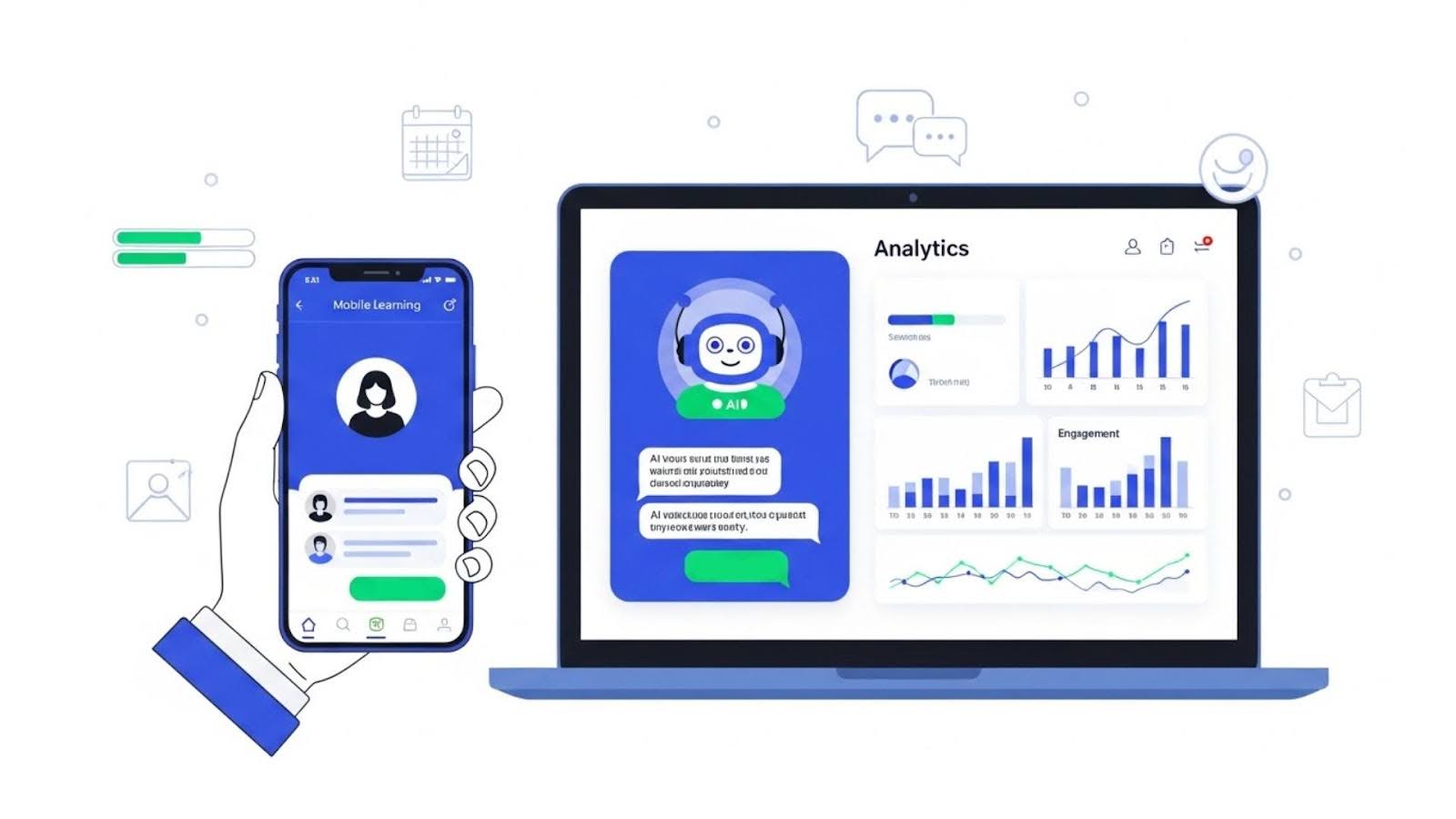
The key is creating seamless experiences across all touchpoints, including enrollment, academic records and financial services. Students should be able to access everything they need through a single portal, eliminating the need to navigate multiple systems or departments.
How Do You Measure Non-Traditional Student Success?
Defining and measuring success for adult learners requires metrics beyond traditional academic indicators. While completion rates and grades remain important, institutions must also track career advancement, salary improvements and professional skill development.
Student persistence and retention rates have rebounded to 76.5%, but institutions serving high percentages of non-traditional students often see different patterns. The key lies in early identification and intervention strategies that address the specific challenges adult learners face.
Successful institutions track multiple indicators, including time to completion, employment outcomes, employer satisfaction with graduates and long-term career progression. These metrics provide a comprehensive view of program effectiveness and help identify areas for improvement.
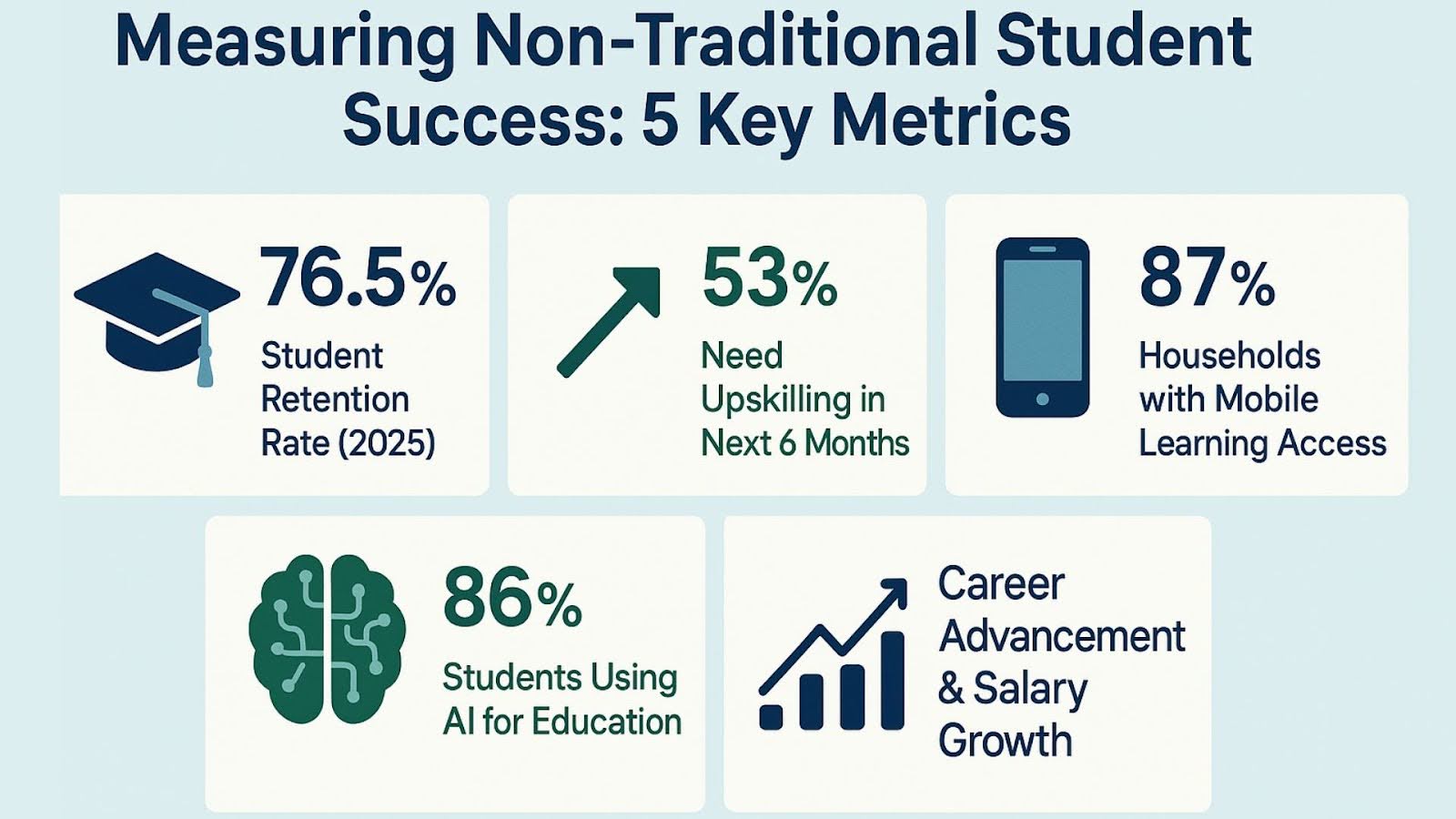
What Continuing Education Trends Are Shaping Higher Ed?
Continuing education is never static. According to a 2025 edX survey of 1,000 adults who are currently working or seeking work, more than half of the respondents reported needing to start upskilling (polishing existing skills) or reskilling (building new skills) in the next six months. This demand creates opportunities for institutions that can respond quickly to market changes.
Micro-credentials and digital badges are gaining traction as professionals seek targeted skill development without committing to full degree programs. The challenge is creating coherent learning pathways that allow students to stack these credentials toward larger goals while maintaining quality and academic rigor.
Corporate partnerships are becoming important as employers seek to upskill their existing workforce. Centralized continuing education models are proving most effective at managing these complex relationships while maintaining consistent quality standards. Institutions that adopt these continuing education trends position themselves as leaders in higher ed.
Why Build Lifelong Learner Relationships?
Institutions are recognizing that adult learners should be viewed as long-term relationships rather than transactional encounters. These students often return for additional credentials as their careers evolve, making customer service and ongoing engagement vital for success.
Creating alumni networks specifically for adult learners helps maintain these relationships beyond graduation. These networks provide ongoing professional development opportunities, peer support and pathways for continued learning. Institutions can demonstrate their commitment to modern learner success through comprehensive support systems that extend throughout the student lifecycle.
Design systems and services that anticipate future needs rather than simply responding to current demands. This proactive approach helps maintain relevance as student needs evolve and creates sustainable revenue streams through ongoing relationships.
How Do You Create Sustainable Non-Traditional Student Programs?
Long-term success requires operational models that can scale with demand. Consider investing in staff training, technology infrastructure and program development processes that can adapt to changing market conditions.
While institutional support remains strong, staffing challenges have been reinvigorated, with a 10% decline in perceived adequate staffing from 2024 to 2025, signaling ongoing struggles with resource allocation. Institutions address these challenges through strategic planning and investment in systems that automate routine tasks.
When programs balance quality with efficiency, growth doesn't compromise the personalized service that adult learners expect. Pay careful attention to capacity planning, instructor training and technology investments that support both students and staff.
Frequently Asked Questions
What defines a non-traditional student? Non-traditional students typically include learners aged 25 and older, working professionals, parents, military veterans and anyone who delayed college enrollment. However, the definition has expanded to include younger students who don't follow traditional enrollment patterns, such as those balancing full-time work with education.
How can institutions measure success for adult learners? Success metrics should include completion rates, career advancement outcomes, salary improvements, employer satisfaction and long-term professional development. Institutions should track both academic achievement and real-world application of skills learned.
What technology features are most important for adult learners? Mobile accessibility, intuitive navigation, offline content access, integrated systems and responsive customer support are essential. AI-powered features like chatbots and personalized learning paths are increasingly important for providing scalable, personalized support.
How do institutions handle the diverse scheduling needs of adult learners? The most effective approaches include offering multiple delivery formats (online, hybrid, evening, weekend), modular course structures, competency-based progression and flexible enrollment periods that accommodate professional schedules.
What role do employers play in continuing education success? Employer partnerships are vital for ensuring program relevance, providing internship opportunities and creating clear pathways from education to career advancement. Successful programs maintain strong industry connections and adapt quickly to changing workforce needs.
Transform Your Approach to Serving Adult Learners
Non-traditional student success requires institutions to embrace fundamental changes in how they deliver education and support services. The institutions that excel make strategic investments in the right systems, processes and support structures. By focusing on flexibility, technology integration and comprehensive student support, institutions can create sustainable programs that serve adult learners throughout their careers while driving institutional growth and relevance.
Modern Campus understands the unique challenges of serving non-traditional students and has built solutions specifically designed for the learner-to-earner lifecycle. Our Lifelong Learning platform streamlines the complexities of continuing education and workforce development programs, while our integrated technology suite enables personalized, seamless experiences. Request a demo to discover how Modern Campus can help you create exceptional experiences for non-traditional students while driving measurable enrollment and retention outcomes.
Last updated: November 5, 2025
